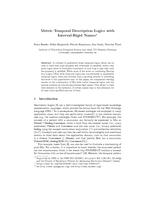Metric Temporal Description Logics with Interval-Rigid Names
Aus International Center for Computational Logic
Metric Temporal Description Logics with Interval-Rigid Names
Franz BaaderFranz Baader, Stefan BorgwardtStefan Borgwardt, Patrick KoopmannPatrick Koopmann, Ana OzakiAna Ozaki, Veronika ThostVeronika Thost
Franz Baader, Stefan Borgwardt, Patrick Koopmann, Ana Ozaki, Veronika Thost
Metric Temporal Description Logics with Interval-Rigid Names
In Clare Dixon, Marcelo Finger, eds., Proceedings of the 11th International Symposium on Frontiers of Combining Systems (FroCoS'17), volume 10483 of Lecture Notes in Computer Science, 60--76, September 2017. Springer
Metric Temporal Description Logics with Interval-Rigid Names
In Clare Dixon, Marcelo Finger, eds., Proceedings of the 11th International Symposium on Frontiers of Combining Systems (FroCoS'17), volume 10483 of Lecture Notes in Computer Science, 60--76, September 2017. Springer
- KurzfassungAbstract
In contrast to qualitative linear temporal logics, which can be used to state that some property will eventually be satisfied, metric temporal logics allow to formulate constraints on how long it may take until the property is satisfied. While most of the work on combining Description Logics (DLs) with temporal logics has concentrated on qualitative temporal logics, there has recently been a growing interest in extending this work to the quantitative case. In this paper, we complement existing results on the combination of DLs with metric temporal logics over the natural numbers by introducing interval-rigid names. This allows to state that elements in the extension of certain names stay in this extension for at least some specified amount of time. - Projekt:Project: Cfaed, HAEC B02, HAEC B08
- Forschungsgruppe:Research Group: AutomatentheorieAutomata Theory, Wissensbasierte SystemeKnowledge-Based Systems
@inproceedings{BBKOT2017,
author = {Franz Baader and Stefan Borgwardt and Patrick Koopmann and Ana
Ozaki and Veronika Thost},
title = {Metric Temporal Description Logics with Interval-Rigid Names},
editor = {Clare Dixon and Marcelo Finger},
booktitle = {Proceedings of the 11th International Symposium on Frontiers of
Combining Systems (FroCoS'17)},
series = {Lecture Notes in Computer Science},
volume = {10483},
publisher = {Springer},
year = {2017},
month = {September},
pages = {60--76}
}
